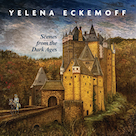

Yelena Eckemoff:
Scenes From The Dark Ages
L&H Production
Yelena Eckemoff isn't the first jazz artist to flirt with progressive rock. Consider Return To Forever's Romantic Warrior as a classic example of jazz musicians gravitating away from material emphasizing individual expression in favour of complex, through-composed ensemble pieces. In its focus on Medieval times and tales of kings, knights, alchemy, and fortresses, Eckemoff's latest, a robust double-disc affair, calls to mind Rick Wakeman's 1975 opus The Myths and Legends of King Arthur and the Knights of the Round Table more than anything relating to contemporary jazz. Yet while that might be so conceptually, musically speaking Scenes From The Dark Ages maintains a solid connecting thread to the pianist's other releases (now twenty-plus albums on her own L&H Production label). As prog-oriented as it is, the set's a true Eckemoff creation in its performances, sensibility, and the communal spirit of its creation.
Whether the recording features a trio, duet, or large ensemble, her albums always bear her indelible stamp, due to her piano playing and distinctive compositional style. That's the case here too, despite its material's prog character. She also has an uncanny gift for fostering an immediate community-like feeling when she gathers collaborators together, in this case at a studio in Mantua, Italy. Recorded over three days in June 2023, the album augments the leader on piano, organ, clavichord, harpsichord, celesta, and synthesizers with flutist Carlo Nicita, electric guitarist Riccardo Bertuzzi, violinist Eloisa Manera, electric bassist Riccardo Oliva, and the one and only Trilok Gurtu on drums and percussion. Whereas earlier Eckemoff releases emphasized piano, Scenes From The Dark Ages changes things up in another way by prominently featuring her on other keyboards too. Further to that, while one would still find this prog-leaning album classified as jazz, there's a strong classical dimension in play too.
Scenes From The Dark Ages has a history extending back decades. The seed for it was planted when as a young girl she was enchanted by the castles, kings, and princesses she read about in folk stories and fairy tales. When she eventually emigrated to the United States, she created a solo project titled Medieval Symphony that blended, in her words, “a medieval feel with prog-rock and fusion.” Yet while she did plan to release the material, she held back after deciding that, in having been created solely by herself, it lacked the vitality of group performance and the interaction of live musicians. Years later, she returned to the material, reworked and added to it, and incorporated jazz improvisation, the result the long-in-the-making Scenes From The Dark Ages.
The change in her sound is evident the moment “Pilgrims” initiates the set with Gurtu's crisp, hard-hitting drumming, rock-styled electric bass and guitar, and Nicita's proggy flute. Eckemoff imposes her signature on the performance with her piano, but the progressive rock character of the ensemble is nonetheless pronounced. Ample stylistic ground is covered in under six minutes, with segues effected seamlessly throughout. Different timbral colours imbue “Village Tavern” with a pastoral-folk feel when celesta, tabla, kalimba, flute, and violin intermingle sweetly. With the latter at the front line, some might hear the Nicita-Manera pairing as some modern-day version of Ian Anderson and Jean Luc-Ponty. Intricate compositions such as “From Peasants Life” and the darker hued “Spell-Bound Fortress” uphold the classic prog tradition whilst also granting solo space to the musicians, and in classic prog fashion four of the fifteen pieces are long-form epics that extend for nine to eleven minutes at a time.
While her keyboard playing is omnipresent, Eckemoff is, as always, a generous host who grants her partners ample opportunities to impose themselves on the material. Playing with a hard-edged attack that sometimes scalds and snarls, Bertuzzi adds a heavy rock feel to the project; while also embellishing his ever-inventive playing with percussion, Gurtu likewise hits hard on many a track. Eckemoff isn't thrown off-balance by any of it; on the contrary, she digs in with as much bite as they do (check out her wailing synth solo in “Legends of the Castle”).
A slightly gentler tone emerges for the regal “Monks in Scriptorium,” which evokes the image of humble scholars devotedly copying ancient scripts, and reverential “Cathedral,” with its soothing organ, ethereal voices, and gentle flute conjuring the vision of a sacred church interior. At the start of the second disc, Oliva's pulsating bass and Gurtu's fills-heavy drums invest “Adventures of a Knight” with a punchy low-slung drive that's offset by the contributions of Manera, Nicita, and on organ Eckemoff. In featuring tracks titled “Battle” and “Tournament,” it's no surprise that the album's second half is at times animated and aggressive. Countering that tendency are the rhapsodic calm of “Chivalry,” perhaps the album's prettiest piece, and the baroque, harpsichord-enhanced splendour of “Masquerade.” Fittingly, the album culminates in a piece that ranges across multiple zones, with baroque, jazz, and rock referenced at different times during “From the Life of the Lords.” As composed as the material generally is, Eckemoff does work moments of improvisation into it, the blistering free episode that appears midway through “Legends of the Castle” one example.
Music continues to pour forth from Eckemoff in abundance, her latest testifying to that in its two hour-long total. In eschewing live performance and touring, her energies completely funnel into composing and all of the tasks involved in album production. Anyone who's been exposed to her earlier releases will once again be impressed by not only the music and performances on the new set but the paintings she created for the project and which do their part in branding the release as an Eckemoff one in the fullest sense. While the other musicians do much to imprint themselves upon Scenes From The Dark Ages, the project never loses its grounding identity as one by her. Here's a rare case where an album by Eckemoff deserves to be covered by the publication Prog as much as DownBeat.April 2025